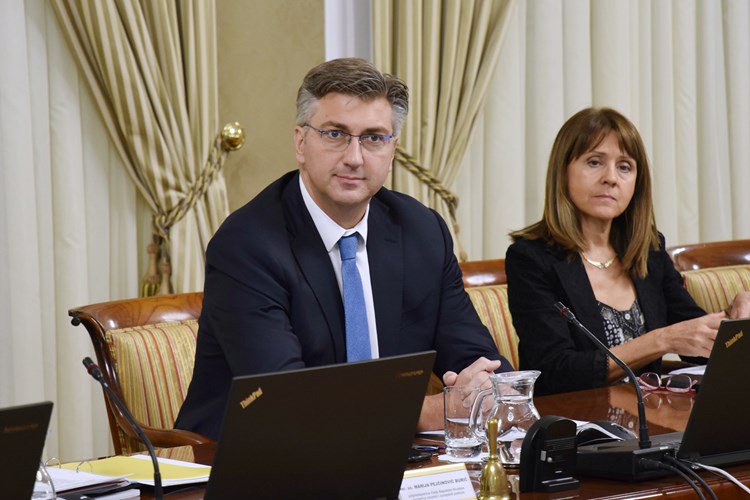- Published: 17.10.2018.
PM says focus must be on peaceful reintegration messages
Prime Minister Andrej Plenkovic said on Wednesday in a comment on a recent protest in Vukovar, that the Croatian public and everybody who is politically responsible needs to put the focus on messages of peaceful reintegration -- namely on building trust, restoring dialogue and coexistence, as this is particularly important today when Croatia is in NATO and the EU and when it wants stability and relations with neighbours based on trust and cooperation, adding that victims would not be forgotten and the government will not allow for war crimes not to be fully investigated.
Regarding the protest staged by war veterans held in Vukovar on Saturday, we heard messages of victims and the need to investigate and prosecute all war crimes committed during the Homeland War, Plenkovic said. Despite the fact that a lot has been done, and by that I am referring to the work of the police, the State Prosecutor's Office and their specialised departments, trials before the UN war crimes tribunal at The Hague and a special tribunal for war crimes in Serbia, this job needs to be continued and efforts must be made in order to investigate everything that hasn't been investigated yet," Plenkovic said at the government session.
In that context he recalled the peaceful reintegration of the Danube River region, as one of the main main political legacies of the first Croatian president Franjo Tudjman, saying that reintegration and all processes aimed at resolving conflicts include a number of measures. "These measures include building trust, restoring dialogue, coexistence and the Amnesty Law," Plenkovic said.
Strategic importance of reintegration for coexistence in Croatia
"It is up to us, the government and the ruling party which inherited the legacy of the first Croatian president, to underline the strategic importance of that achievement for coexistence in Croatia - reconciliation process, building trust, building a society in which crimes will not be forgotten, especially not war crimes, which are not covered by the Amnesty Law. However, we also must create an environment which is more appropriate for 2018 and the future by building trust and enabling coexistence.
The protest in Vukovar was organised by those dissatisfied with the efficiency of the national judiciary who called on institutions to put an end on impunity for war crimes.
Prime Minister Andrej Plenkovic said on Wednesday it seemed that none of the three referendum questions had collected a sufficient number of signatures, announcing that he would task the public administration minister with enabling the two petitions' organisers and everyone interested to see all the signatures that were declared invalid.
"Regarding the signatures collected by The People Decide and The Truth about the Istanbul Convention civil initiatives, according to the information Public Administration Minister Lovro Kuscevic received today based on the work of APIS, which was tasked with counting the signatures, and the special commission which verified that report, it seems that neither initiative collected the sufficient number of signatures," Plenkovic said at a cabinet meeting.
He said the government would adopt a conclusion on that and send it to parliament, which asked he government to organised the signature counting.
"We will also task the public administration minister with enabling the civil initiatives, as well as every other interested party, to see and check the signatures that were declared invalid, so that those interested can see what exactly it's about, in full transparency," Plenkovic said.
Two questions referred to changing the election legislation and one to repealing the ratification of the Istanbul Convention.
The People Decide civil initiative as well as The Truth about the Istanbul Convention civil initiative conducted their respective signature-collection campaigns on May 13-27.
Activists from the People Decide group have called for a reduction in the number of seats in the current 151-seat parliament and that voters be offered an opportunity to select three preferential candidates instead of the current possibility of one preferential candidate. They are also requesting that the boundary lines of constituencies correspond to county boundary lines, that the current five-percent election threshold be lowered to four percent and that postal and electronic voting be introduced.
Those activists are also calling for an amendment to Article 72 of the Croatian Constitution which was why the petition included two questions.
The first question is about the above-mentioned requests, while the second questions deals with the possibility of reducing the rights of lawmakers representing ethnic minorities. The initiative is calling for ethnic minority parliamentary deputies to be denied the right of taking part in a no-confidence vote against governments and of having a say in budget adoption.
Prime Minister Andrej Plenkovic said at a cabinet meeting on Wednesday it seemed that none of the three referendum questions had collected a sufficient number of signatures.
Two questions referred to changing the election legislation and one to repealing the ratification of the Istanbul Convention.
Public Administration Minister Lovro Kuscevic will submit a report on that at today's meeting, after which it will be sent to parliament, Plenkovic said.
